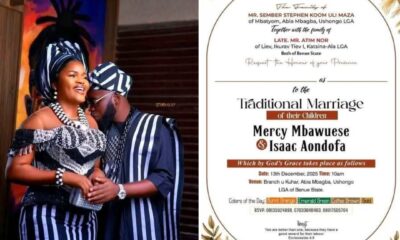Latest News
Female Judges: Nigerian women kick against descrimination

Nigerian women have criticised the attempt by state governments to discriminate against female judges in appointing them to key decision making positions as chief judges in some states. They are also raising their voices against the attempt to prevent the most senior judge in Gombe state from occupying the seat of the chief judge of the state.
It was gathered that the current chief judge in the state will retire in about three weeks time. The most senior judge who should take over from him is a female, Justice Beatrice Iliya. “We are aware that strong moves are going on not to give her on the excuse that she is from the same senatorial zone (Gombe South) with the retiring chief judge, CJ. Since when did the judiciary start this zoning of the office of the CJ. It is not a political appointment. Helps us fight this battle and let us see our sister given what is her right. Please raise this battle cry for us across Nigeria so that it will be heard that Nigerian women demand the Governor Inuwas Yahaya appoints Justice Beatrice as the he next CJ of Gombe State,” a female activist told newsmen in a text message.
According to her, “the case of Kebbi State is still fresh in our minds. Sisters, let’s fight this battle please.”
It was reported that Governor Atiku Bagudu of Kebbi state sacked the acting chief judge of the state, Elizabeth Asabe Karatu, and replaced her with Muhtar Imam Jega.
Karatu had written a petition to the Nigerian Judicial Council, NJC alleging that she was denied her rights to confirmation because she is a Christian. The State House of Assembly refused to confirm Karatu.
However, the governor said: “It baffles me when I read a story on social media that I did not forward Karatu’s name for confirmation because of her religion. “If you could recall, I re-submitted the name of Karatu for the second time on June 2, 2018, to the House for confirmation as Chief Judge. I was informed that on Aug. 1, 2018, the House refused to confirm her appointment over alleged alteration of her date of birth and primary school certificate.”
He also disclosed how he wrote to the Nigerian Judicial Council, NJC, on his efforts to ensure Karatu was confirmed by the House without fruitful outcome, stressing that the refusal to confirm her was not based on her faith.
But women activists are not buying the argument of the governor as they believe strongly that the reverse was the case. They are also appealing to the Gombe not to discriminate against the most senior judge in the state because she is a female and from the zone of the incumbent chief judge.
Ene Ede, a development advocate, who is working to promote an equitable world, particularly in Nigeria, noticed that for the past four years in particular, the women of ethnic nationalities are being deliberately marginalised, excluded and discouraged. Not only in appointments, or elective positions in governance and leadership, but in social schemes and programming, they are excluded.
According to Ede, of “the six female ministers of PMB, no Woman from the ethnic nationalities was found worthy despite the enormous set skills, capacity, character, competence and courage.”
Ede, who also the publisher of The Woman Today weekly paper, observed that Kano state was denied first female Chief Judge because she was surprisingly said to only be married to Kano indigene, the immediate past president of NBA National President, Mamod, whom she had all her children for and has been a dedicated, capable and reliable wife and mother. I practice diversity in it’s entirety and not just promote it. This is not acceptable as it had the potential to pitch women of different divides against one another. More so, it limits the capacity and differential competences they bring to best on failing governance and leadership.
Ojobo Atuluku, a lawyer and public policy analyst, who is also a women’s rights advocate said the Judiciary is the last bastion of hope for a nation that is ridden with corruption and abuse of process. “If the Judiciary falls we are all lost and it is anarchy and terror that reigns. Governors rejecting women who have precedence for consideration as Chief Judges is not about the women. The National Judicial Council sits back and allows politicians to politicise the judiciary and is in effect losing their powers and the principle of separation of powers in a democracy can no longer hold. First, it is the women and the nation is quiet, next it will be the male judges and membership of the NJC.”
She therefore called on “the NBA and civil society to protect the judiciary and react immediately to the shenanigans of the Executive and the parliament. The NJC contrary to its raison d’etre is not able to protect the Judiciary from the whims and caprices of the Executive. It was Kebbi State, then Cross River, now Gombe.”
Nonetheless, the hope is that the governor of Gombe State will do the right thing and appointment the most senior and qualified person as the chief judge in the state.
(Credit; Realnews)

























